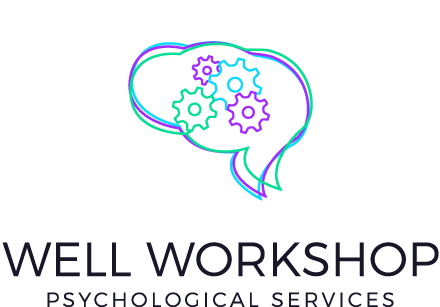What is a Psychoeducational Assessment
Well Workshop is happy to offer assessment testing with Registered Psychologist Brittany Norlin!
A psychoeducational (psych-ed) assessment can be provided for children and adults. In addition to the psych-ed consultation with parents, school support teams, and other healthcare professionals can be provided. A psych-ed involves exploring one’s reasoning, academic, executive functioning, memory, intellectual ability, and attention skills. A psych-ed is helpful in gathering a comprehensive picture of one’s learning profile. Understanding where learning difficulties arise is important to determine the appropriate supports that should be put in place to help you/your child overcome certain educational/workplace challenges. The most important result of a psych-ed are the comprehensive recommendations for home, school or work accommodations. Accommodations can be made in the classroom (ex. IEP)/workplace for tests, and assignments when assessment results support a need for assistance. This testing is not necessary for everyone, however, if you, teachers, doctors, parents or an employer have noted concerns about your school or work performance, an assessment can be a source of finding more help.
Psychoeducational assessments are conducted by a registered school psychologist and in addition to understanding your child’s potential, showing how your child learns, can provide a diagnosis of a learning disability- reading (dyslexia), writing (dysgraphia) and mathematic (dyscalculia), attention deficit hyperactivity disorder (ADHD), developmental disability, and identify any other social/emotional/behavioural or psychological problems such as anxiety.
Who Would Benefit?
A psychoeducational assessment diagnoses the root cause of a client’s/student’s academic and/or behavioural struggles, and identifies a plan for solving the problem. Every child is different in terms of their needs and abilities, but here are some of the signs that your child may need a psychoeducational assessment:
If your child consistently studies hard but the marks don’t reflect his/her effort
If your child is clearly intelligent but, because of procrastination and poor planning skills, cannot deliver their homework or assignments on time
If your child’s teacher notes in his/her report card that they need to pay more attention or stay more focused in class
If your child presents with any behavioural or emotional problems related to school or home
If your child consistently doesn’t want or doesn’t like to go to school
If your child’s marks are good in all areas except one or two, such as Math or English
Feeling overwhelmed or anxious at school or during exams
Not achieving results at full potential
Bullying or rejection at school
If you think your child would benefit from school accommodations
Students facing one or more of these issues may have an un-diagnosed learning disability or other hidden challenges.
How to Get Started on a Psychoeducational Assessment
With Well Workshop, you can self-refer or your therapist may refer you to have an assessment completed by our in-house therapist Brittany Norlin, Registered Psychologist. Once you've initiated interest in completing an assessment, we will take care of the logistics and do our best to make the process as seamless as possible. We recognize that this is a cost to the client/family, and it is prudent to check with your insurance provider to see if all or part of the cost is covered.
What to Expect?
A psychoeducational assessment is administered by a psychologist or psychometrist and combined with clinical interviews, observations, and historical records to help understand how your child learns, and identify if and how they’re struggling.
A comprehensive psychoeducational assessment is typically comprised of five parts:
-
During an initial screening interview, the client/parents (and student when appropriate) will meet with a psychologist to discuss any ongoing issues and determine if a psychoeducational assessment is reasonable and necessary. This is typically 1-hour.
-
The client/student will then be given various tests to assess his/her academic and reasoning skills, intellectual abilities, memory, attention, and executive functions. The testing duration will be adjusted to your child’s individual needs, but will typically last four to five direct testing hours.
-
This part of the assessment involves gathering collateral and qualitative information through clinical interview and observation, that would allow the psychologist to better understand your child. Clinical interviews with parents are conducted and questionnaires are given to the parents, teacher (and student when appropriate) to complete.
-
Scored test results, interview insights, and questionnaire information is developed into a comprehensive report for parents. The report will also include recommendations for any necessary school accommodations and at-home support strategies. Report writing is typically provided 4-5 report writing hours.
-
The parents (and student when appropriate) will meet with the psychologist to go over the report, review the results and recommendations tailored to the client/student, and a report is provided. At this time, the psychologist will provide the report and answer any questions that clients/parents may have. This is typically 1-hour. Turn-around time is typically two weeks from the last assessment session.


